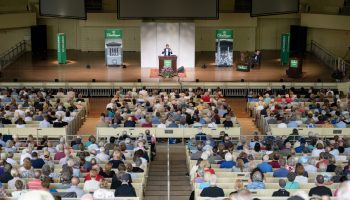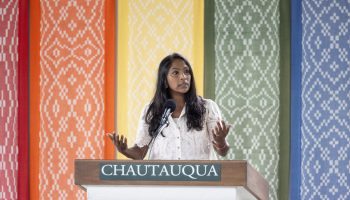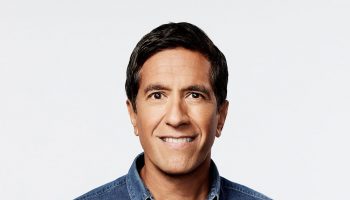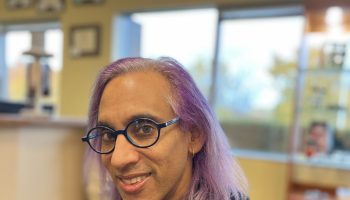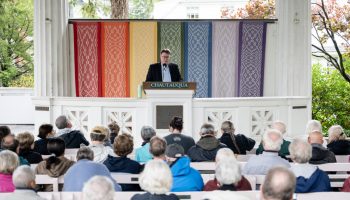At 10:45 a.m. Wednesday in the Amphitheater, two experts will introduce and try to explain one of the world’s most enigmatic and fascinating cities. Their subject is Cairo.
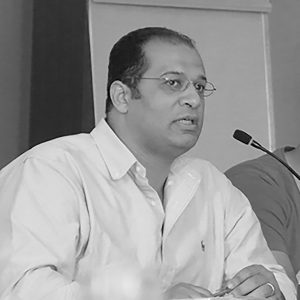
Michele Dunne, director of Carnegie Endowment for International Peace’s Middle East Program, will be joined on the Amp stage by Egyptian civic activist Kareem Ibrahim, a leader in the effort to make Egypt’s capital city more sustainable and responsive to its roughly 17 million inhabitants.
“We are approaching a special moment for cities this year,” Dunne said. “In October, the United Nations will convene Habitat III to promote a new urban agenda to make cities around the world more sustainable.”
The U.N. gathers only every 20 years to assess progress and map out future goals and objectives for cities. The first Habitat summit was held in 1976.
Dunne said there were three big issues for the conference to address: The idea of sustainable, people-centered development; a need for access to employment, services and transportation; and more efficient use of resources.
“Cairo is going the wrong way on all three counts. A city already covering the land area of metropolitan Los Angeles is still spreading out,” she said. “The Egyptian economy doesn’t generate enough jobs, especially for young people — even young people with an education. And the larger trends are not encouraging. Egypt is experiencing one of the fastest rates of population growth in the Arab world, which is, overall, growing in population at a rate faster than any other region in the world except sub-Saharan Africa. The gap is large and growing between the expectations of young people and the quality of government.”
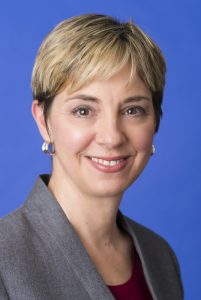
Infrastructure and services are often inadequate in Cairo, Dunne said, and resource allocation and use is inequitable and inefficient.
Further, “the government has been consistently unresponsive in the face of a growing crisis in education and public health,” she said.
Despite Cairo’s rapid growth in population, Dunne said there is no shortage of housing. In fact, there are significant swaths of unused housing in the city.
“There is a general belief in Egypt that it is more lucrative, and maybe cheaper, to build new housing than to maintain or renovate older stock,” she said. “The result in Cairo is that informal communities have arisen in random areas around the city, based on older, often abandoned housing. There is little incentive for the authorities to maintain services and infrastructure in such an environment.”
Dunne said downtown districts like Zamalek, situated on an island in the Nile, and Garden City, where the U.S. Embassy is located, have seen a significant exodus of wealthy residents.
“They have abandoned these older neighborhoods in favor of new, often gated communities northeast of the city, such as New Cairo,” she said. “Most have Arabic names, but one is called Beverly Hills.”
In addition to its structural problems, Cairo is the capital and economic center of a large nation in an unstable region governed by an unelected military-backed regime.
“In Egypt, there really are four branches of government: executive, legislative, judicial and military,” Dunne said. “The influence of the latter is pervasive. And inflation in the economy is rising at the same time the Egyptian currency is tanking.”
In particular, Dunne said, land use and development — the so-called “real estate model” — is the source of much of the wealth and influence accumulated by the Egyptian military and economic elite.
“The Egyptian military controls an amazing amount of real estate,” Dunne said. “Its use, development and sale has financed much of the military’s rising power.”
Ibrahim, a civic activist and urban planner, Dunne said, is “an important part of the global network for urban reform. He is a passionate advocate for participatory development at the grassroots. He is dedicated to improving services and infrastructure to make the city more livable. His Tadamun project is a part of this. With his experience and qualifications, Ibrahim could have joined the discouraging brain drain out of Egypt. He chose to stay, and work for urban sustainability and progress.”
While Ibrahim and others continue the struggle for progress and improvement in Egypt, what should be the U.S. posture?
“Well, it is not up to the United States to decide whether Egypt’s government will or won’t be democratic,” Dunne said. “I think there is change afoot in Egypt that has little to do with the U.S. There is certainly resentment toward an unrepresentative government supported by a military whose aim is to run, not defend, the country.”
More political changes are coming, Dunne predicted.
“While some have expressed the view that the current regime is a throwback to the days of Mubarak’s decades-long rule, I think we are now witnessing repression not seen in that earlier era,” Dunne said. “Three thousand people have been killed by the authorities in street demonstrations in recent years, and we believe there are currently 40,000 political prisoners in Egypt. I think human rights abuses in the country are fueling the insurgency in the Sinai peninsula.”
There is some encouraging news. Dunne believes the peaceful relationship between Israel and Egypt, which was essentially subsidized by American assistance for many years, has developed a stability independent of the U.S.
“Gaza is a huge, joint Israeli-Egyptian problem,” she said.
Dunne believes the still-substantial American military assistance to Egypt is more focused on supporting bilateral cooperation in other areas, such as Libya.
“And there was a Saudi delegation in Israel recently,” she said. “The Palestinian problem obviously has not been solved, but other factors — Iran is definitely one of them — may be pushing traditional antagonists together. There’s always room for optimism.”

